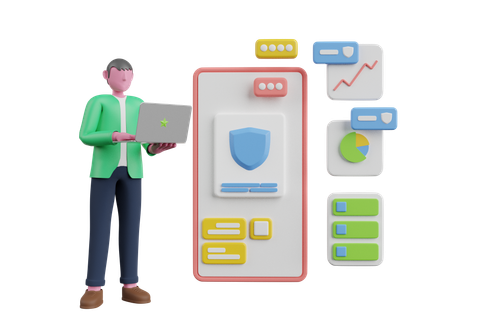Mobile App or Web App
- jamesarmstrong3
- Aug 19, 2024
- 5 min read

The Key Benefits of Mobile Apps Over Web Apps
In today’s rapidly evolving tech-driven landscape, businesses and developers are often confronted with the crucial decision of choosing between developing a mobile app or a web app. Each of these platforms offers distinct advantages; however, mobile apps boast a unique array of benefits that make them an increasingly powerful tool for engaging users and enhancing the overall user experience. In this comprehensive analysis, we will explore the key benefits of mobile apps over web apps, helping you understand why they might be the better choice for your specific needs.
1. Superior Performance and Speed
Mobile apps generally offer a marked improvement in performance compared to web apps. This is primarily because they are installed directly on the user’s device, allowing them to efficiently leverage the device’s hardware, including its processing power, memory, and graphics capabilities. As a result, mobile apps often deliver faster loading times, smoother user interactions, and a more responsive experience.
Additionally, mobile apps can utilise local data storage, enabling them to store frequently accessed data directly on the device. This reduces the dependency on constant internet connectivity and minimises delays caused by network latency. The ability to function with optimised performance, even under varying network conditions, makes mobile apps an attractive option for delivering a seamless user experience.
2. Enhanced and Immersive User Experience
The user experience (UX) in mobile apps is often more refined and tailored, providing a richer and more immersive interaction. Mobile apps can fully utilise the native features of the device, such as the camera, GPS, accelerometer, gyroscope, and microphone, to offer functionalities that are both engaging and contextually relevant. For example, augmented reality (AR) applications can use the camera and GPS to overlay digital content onto the real world, providing users with a highly interactive experience.
Furthermore, mobile apps are designed to adhere to the specific design guidelines and user interface (UI) standards set by the operating systems (iOS or Android). This means that they can offer a more intuitive and consistent interface that feels familiar to users, enhancing ease of use and increasing user satisfaction.
3. Offline Accessibility and Continuous Availability
One of the most significant advantages of mobile apps is their ability to operate offline, ensuring that users have access to critical functionalities and content even without an active internet connection. Unlike web apps, which typically require a continuous internet connection to function, mobile apps can cache data locally, allowing users to view and interact with content that has been previously downloaded or stored.
This feature is particularly beneficial for users in regions with unstable or slow internet connections, as well as for those who frequently travel or need access to information while on-the-go. Offline accessibility ensures that the app remains functional and relevant, regardless of the user’s location or network conditions.
4. Direct and Engaging Push Notifications
Mobile apps possess the unique capability to send push notifications directly to users’ devices, providing timely and personalised updates that foster engagement. Push notifications are a powerful tool for maintaining user retention, as they enable businesses to deliver targeted messages, promotions, reminders, and alerts that keep users informed and engaged with the app.
This direct communication channel is invaluable for driving user interaction and encouraging frequent app usage. By sending tailored notifications based on user behaviour, preferences, or location, businesses can significantly enhance the relevance and impact of their messaging.
5. Seamless Integration with Device Features
Mobile apps excel in their ability to seamlessly integrate with a device’s built-in features and other installed apps, offering a cohesive and unified experience. For instance, mobile apps can leverage the device’s GPS to provide location-based services, access the camera for taking photos or scanning QR codes, and interact with other apps for sharing content or accessing cloud storage.
This deep integration enhances the functionality of the app, enabling it to deliver services that are more personalised, efficient, and context-aware. The ability to tap into the full range of device features allows mobile apps to provide an experience that is both holistic and enriched, making them indispensable tools for users.
6. Robust Security Features
Mobile apps often offer enhanced security features that provide greater protection for user data compared to web apps. They can utilise device-specific

security measures, such as biometric authentication (fingerprint or facial recognition), which offer an additional layer of security beyond traditional password-based systems. Additionally, mobile apps can use secure storage solutions, like encrypted file storage, and sandboxing techniques to ensure that sensitive data is protected from unauthorised access.
Moreover, before mobile apps are made available for download, they must pass through rigorous security checks and approval processes by app stores (Google Play Store, Apple App Store). These stores enforce stringent security protocols to ensure that apps meet certain standards for security and privacy, providing users with an added level of confidence when downloading and using apps.
7. Diverse Monetisation Opportunities
Mobile apps present a wide range of monetisation strategies that can be more effectively implemented compared to web apps. Developers can incorporate in-app purchases, subscription models, and ad integrations to generate revenue, all within the controlled environment of a mobile app. These monetisation strategies can be further optimised through analytics and user behaviour tracking, allowing for continuous improvement and increased profitability.
Additionally, app stores provide a centralised platform for showcasing and selling apps, making it easier for developers to reach a global audience and attract potential customers. The app stores also offer promotional opportunities, such as featured placements, which can significantly boost visibility and downloads.
8. Advanced Personalisation and Customisation
Mobile apps are particularly adept at delivering personalised and customised experiences to users. By leveraging data on user preferences, behaviour, and interactions, mobile apps can tailor the content, interface, and functionality to meet the specific needs of individual users. For example, a news app might prioritise stories based on a user’s reading habits, while a fitness app could suggest workout routines based on the user’s previous activities.
This level of personalisation enhances user satisfaction by making the app more relevant and responsive to the user’s needs. The ability to offer a customised experience that evolves with the user over time can lead to increased user loyalty and long-term engagement.
9. Increased Brand Visibility and User Engagement
Having a mobile app significantly increases brand visibility, as the app icon on a user’s home screen serves as a constant reminder of the brand’s presence. This frequent visual touchpoint helps keep the brand top-of-mind for users, fostering a stronger emotional connection and encouraging repeated interactions.
Furthermore, the convenience of accessing the app directly from the home screen, without the need to open a browser or enter a URL, simplifies the user journey, and promotes higher engagement rates. Over time, this increased visibility and ease of access can lead to greater brand loyalty and a more dedicated user base.
Conclusion
While web apps offer their own set of advantages, mobile apps provide a range of benefits that can significantly enhance user engagement, satisfaction, and overall experience. From superior performance and offline capabilities to seamless integration with device features and advanced security, mobile apps represent a compelling option for businesses seeking to deliver a high-quality and impactful user experience. By leveraging the unique strengths of mobile apps, businesses can create a more effective, engaging, and personalised platform that resonates with their audience and drives long-term success.




Comments